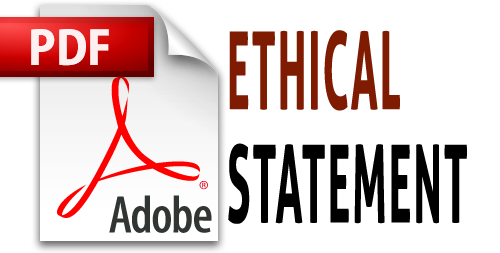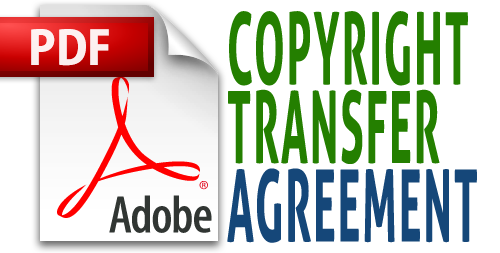KEBIJAKAN BERBASIS BUKTI DALAM PENGELOLAAN SAMPAH PLASTIK DI DAERAH ALIRAN SUNGAI: SUATU KAJIAN LITERATUR
Abstrak
Pencemaran sampah plastik di Daerah Aliran Sungai (DAS) mencerminkan kompleksitas tata kelola multisektor dan perlunya pendekatan kebijakan berbasis bukti (EBP). Meskipun EBP diakui semakin penting dalam perumusan kebijakan lingkungan, implementasinya di negara berkembang seperti Indonesia masih menghadapi kendala struktural dan politis. Artikel ini menelaah penerapan EBP dalam kebijakan pengelolaan sampah plastik di DAS melalui studi pustaka dengan analisis tematik terhadap 30 sumber literatur (26 artikel jurnal, 1 laporan pemerintah, 1 laporan non-pemerintah, dan 2 laporan internasional) yang terbit pada periode 2014–2024. Hasil kajian menunjukkan bahwa implementasi EBP dihambat oleh ketimpangan produksi pengetahuan, bias seleksi bukti, lemahnya koordinasi lintas sektor, serta politisasi bukti oleh aktor kebijakan. Temuan disintesis dalam empat dimensi utama: produksi, seleksi, integrasi, dan politisasi bukti. Artikel ini berkontribusi secara teoretis terhadap pengembangan studi EBP di sektor lingkungan negara berkembang, serta menawarkan implikasi praktis terkait penguatan sistem data, mekanisme koordinasi, dan pelibatan aktor non-negara dalam proses kebijakan. Kajian ini merekomendasikan pembangunan ekosistem kebijakan yang lebih terbuka, deliberatif, dan adaptif terhadap kompleksitas lingkungan di tingkat lokal.
Plastic waste pollution in river basins reflects the complexity of multisectoral governance and the necessity of an evidence-based policy (EBP) approach. While EBP is increasingly recognized as essential in environmental policymaking, its implementation in developing countries such as Indonesia remains constrained by structural and political challenges. This article examines the application of EBP in plastic waste management policies within river basins through a literature-based study with thematic analysis of 30 sources (26 journal articles, 1 government report, 1 non-governmental report, and 2 international reports) published between 2014 and 2024. The findings reveal that EBP implementation is hindered by disparities in knowledge production, biased evidence selection, weak cross-sectoral coordination, and the politicization of evidence by policy actors. These findings are synthesized into four key dimensions: production, selection, integration, and politicization of evidence. The article contributes theoretically to the development of EBP studies in environmental governance in developing countries and offers practical implications related to strengthening data systems, improving coordination mechanisms, and engaging non-state actors in the policy process. It recommends building a more open, deliberative, and adaptive policy ecosystem responsive to local environmental complexities.
Kata Kunci
Teks Lengkap:
PDFReferensi
Afifah, N. A., Triyadi, R. A., Lukito, H., Pandu, A., Gema, I. P., Waisnawa, B., & Mulyana, A. (2025). Perbandingan Status Mutu Air Sungai Bengawan Solo 2020 – 2022 dengan Metode STORET dan Metode Indeks Pencemaran. Jurnal Ilmu Lingkungan, 23(3), 742–750. https://doi.org/10.14710/jil.23.3.742-750
Akenji, L., Bengtsson, M., Hotta, Y., Mizuki, K., & Hengesbaugh, M. (2020). Plastic Waste and Recycling: Environmental Impact, Societal Issues. Elsevier.
Astuti, A. D., & Frimawaty, E. (2023). Karakteristik Sampah Sungai dan Perilaku Masyarakat Pesisir Terhadap Sampah Plastik : Studi Kasus di Sungai. Jurnal Ilmu Lingkungan, 21(1), 76–85. https://doi.org/10.14710/jil.21.1.76-85
Azizah, S. Y. N., & Sudarti. (2025). Analisis Perilaku Masyarakat dalam Membuang Sampah di Sungai Bedadung Kabupaten Jember. Jurnal Ilmiah Publika, 11(1), 65–71.
Basri, S., K, B., Syaputra, E. M., & Handayani, S. (2021). Microplastic Pollution in Waters and its Impact on Health and Environment in Indonesia: A Review. Journal of Public Health for Tropical and Coastal Region, 4(2), 63–77. https://doi.org/10.14710/jphtcr.v4i2.10809
Cairney, P. (2016). The Politics of Evidence-Based Policy Making. London: Springer Nature. https://doi.org/10.1057/978-1-137-51781-4
Cleveland, P., Cleveland, D., Morrison, A., Dinh, K. H., Nguyen, A., Hai, P., … Duy, K. T. (2025). Uncovering Plastic Pollution : A Scoping Review of Urban Waterways , Technologies , and Interdisciplinary Approaches. Sustainability, 17(7009), 1–28. https://doi.org/10.3390/su17157009
Cooke, S. J., Cook, C. N., Nguyen, V. M., Walsh, J. C., Young, N., Cvitanovic, C., … Pullin, A. S. (2023). Environmental Evidence in Action: On the Science and Practice of Evidence Synthesis and Evidence-Based Decision-Making. Environmental Evidence, 12(1), 1–10. https://doi.org/10.1186/s13750-023-00302-5
Cordova, M. R., Bernier, N., Yogaswara, D., Subandi, R., Wibowo, S. P. A., Kaisupy, M. T., & Haulussy, J. (2023). Land ‑ Derived Litter Load to the Indian Ocean: A Case Study in the Cimandiri River , Southern West Java , Indonesia. Environmental Monitoring and Assessment, 195(1251), 1–16. https://doi.org/10.1007/s10661-023-11831-4
Dao, S. Q. (2023). The Effectiveness of Environmental Policy in Addressing Climate Change. Journal of Public Representative and Society Provision, 3(1), 31–39. https://doi.org/10.55885/jprsp.v3i1.189
Daryanti, & Sudarwanto, A. S. (2024). Legal Enforcement of Individual Behavior in the Context of Environmental Policy. Indonesian Journal of Social Sciences, 16(2), 93–101. https://doi.org/10.20473/ijss.v16i2.55387
Ho, H. C., & Reksa, D. A. (2023). Environmental policy in Indonesia from the post-New Order era to the present: Positive adjustments and limitations. Media, Politics and Environment: Navigating the Asian Anthropocene. Singapore: Springer.
Jambeck, J. R., Geyer, R., Wilcox, C., Siegler, T. R., Miriam, P., Anthony, A., … Law Kara Lavender. (2015). Plastic Waste Inputs from Land into the Ocean. Science, 347(6223), 768–770.
Kattumuri, R. (2018). Sustaining Natural Resources in a Changing Environment: Evidence, Policy and Impact. Contemporary Social Science: Journal of the Academy of Social Sciences, 13(1), 1–16. https://doi.org/10.1080/21582041.2017.1418903
KLKH. (2020). National Plastic Waste Reduction Strategic Actions for Indonesia. Kementerian Lingkungan Hidup Dan Kehutanan Republik Indonesia.
Kurniawan, T. A., Bandala, E. R., Othman, M. H. D., Goh, H. H., Anouzla, A., Al-Hazmi, H. E., … Khoir, A. N. (2024). Implications of Cimate Change on Water Quality and Sanitation in Climate Hotspot Locations : A Case Study in Indonesia. Water Supply, 24(2), 517–542. https://doi.org/10.2166/ws.2024.008
Leni, N. E., Alexandri, M. B., Ismanto, S. U., & Widyaningsih, I. (2018). Pemanfataan Hasil Penelitian Dalam Kebijakan Publik Studi Kasus Pada Badan Penelitian Dan Pengembangan Provinsi Sumatera Barat. Responsive, 1(2), 75–80. https://doi.org/10.24198/responsive.v1i2.20677
Lestari, P., & Trihadiningrum, Y. (2019). The Impact of Improper Solid Waste Management to Plastic Pollution in Indonesian Coast and Marine Environment. Marine Pollution Bulletin, 149. https://doi.org/10.1016/j.marpolbul.2019.110505
Monk, K. A. (2024). Enhancing Environmental Policy through Evidence Synthesis: A Review of the Environmental Evidence for the Future (EEF) Initiative. Environmental Evidence, 13(7), 1–6. https://doi.org/10.1186/s13750-024-00329-2
Nugroho, A. H. (2015). Evaluasi Prinsip Good Environmental Governance (GEG) dalam Penerapan kebijakan Pengelolaan Sampah di Kabupaten Kendal. Journal of Politic and Government Studies, 4(3).
Parkhurst, J. (2017). The Politics of Evidence: From Evidence-Based Policy to the Good Governance of Evidence. In Taylor & Francis (Vol. 3). Park Square.
Purwendah, E. K., & Periani, A. (2019). Implementation of Presidential Regulation Number 83 of 2018 Concerning Handling of Sea Was in Order to Provide Protection and Preservation of The Sea Environment for Indonesia. Ganesha Law Review, 1(2), 18–37.
Sarjito, A. (2024). Green Governance: Integrating Environmental Policy Into Public Decision-Making. Public Policy Journal, 5(1), 39–54. https://doi.org/10.37905/ppj.v5i1.2525
Sunarya, A. (2024). Climate and Environmental Policy in Indonesia : Challenges and Opportunities. Jayapangus Press, 7(1), 195–206.
Sungai Watch. (2021). 2021 Impact Report. Diakses dari https://sungai.watch/pages/about-us
Teguh, A., & Syam, F. (2024). Evaluation of Legal Policy Implementation in Addressing Environmental Crisis : A Case Study on Plastic Waste Management. Indonesian Journal of Interdisciplinary Research in Science and Technology (MARCOPOLO), 2(4), 405–414. https://doi.org/10.55927/marcopolo.v2i4.8757
United Nations Environment Programme. (2021). From Pollution to Solution: A Global Assessment of Marine Litter and Plastic Pollution. UNEP. https://www.unep.org/resources/ pollution-solution-global-assessment-marine-litter-and plastic-pollution
Wicaksono, E. A., Werorilangi, S., Galloway, T. S., & Tahir, A. (2021). Distribution and Seasonal Variation of Microplastics in Tallo River, Makassar, Eastern Indonesia. Toxics, 9(129), 1–13. https://doi.org/10.3390/toxics9060129
World Bank. (2021). Plastic waste discharges from rivers and coastlines in Indonesia. Marine Plastics Series, East Asia and Pacific Region. Washington, DC: International Bank for Reconstruction and Development / The World Bank. https://www.worldbank.org.
Yahman, Y., & Setyagama, A. (2022). Government Policy in Regulating the Environment for Development of Sustainable Environment in Indonesia. Environment, Development and Sustainability, 25(4). https://doi.org/10.1007/s10668-022-02591
DOI: https://doi.org/10.24198/responsive.v8i3.65971
Refbacks
- Saat ini tidak ada refbacks.

This work is licensed under a Creative Commons Attribution 4.0 International License.













